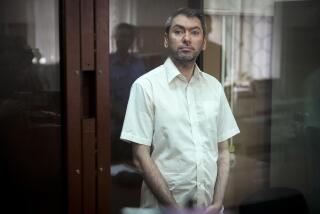Sakharovs See Ouster of Gorbachev
- Share via
PARIS — Soviet President Mikhail S. Gorbachev is in danger of being ousted from power, human rights activist Andrei D. Sakharov and his wife said today in a newspaper interview.
“The conservatives will overthrow Gorbachev or at least impose their views on him,’ the conservative French daily Le Figaro quoted Sakharov as saying during an interview at his Moscow home.
Le Figaro said the six-hour interview was conducted over three consecutive evenings.
The Soviet physicist’s wife, Yelena Bonner, was quoted as adding of the Soviet leader, “I think he will be overthrown soon” because he refuses to seek the support of the people through direct elections.
‘Why Is He Afraid?’
“The only real defense for a chief of state is direct election,” she said. “Why is Gorbachev afraid? We would elect him. Our country has no other leader.”
Bonner, who is also a prominent rights activist, said that when Gorbachev is ousted, “so will (be) all those who believed in perestroika, “ his program to restructure Soviet society and its economy, the paper said.
“I would not bet 10 rubles on Gorbachev,” she was quoted as saying.
Sakharov, a physicist and Nobel Peace Prize-winner, said the West must continue to pressure the Soviet Union on rights issues, at least until an international human rights conference that is scheduled in Moscow in 1991.
Perestroika Necessary
He said the meeting, which initially was opposed by Britain and the United States, “should only take place if the (human rights) situation in the Soviet Union is truly satisfactory.”
Sakharov was quoted as telling Le Figaro that perestroika was “absolutely necessary. There is no other solution. This doesn’t mean that you have to support Gorbachev without reservation. To associate perestroika 100% with his name would not be fair.”
“Gorbachev could come under pressure. He could have other ideas,” Sakharov said. “The restructuring has to be supported in general without worrying whether some people are going to be upset. For the Soviet individual today, the question of collective rights is more immediate than individual rights.”
More to Read
Sign up for Essential California
The most important California stories and recommendations in your inbox every morning.
You may occasionally receive promotional content from the Los Angeles Times.












